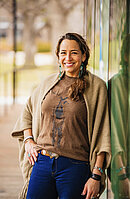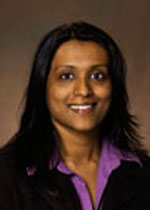RCA Names Broadening Participation Faculty Fellows


The Office of Research and Creative Activity has named Hollie Mackey, NDSU associate professor of education and Febina Mathew, NDSU associate professor of plant pathology as faculty fellows. Both will be working on broadening participation, which the NSF defines as expanding opportunities for people of all racial, ethnic, geographic, socioeconomic backgrounds, sexual orientations, gender identities and to persons with disabilities. These faculty fellow positions were added with the goal of strengthening contributions from the research and innovation portfolio in support of President Cook’s goal of building a stronger culture of diversity, inclusion and respect while also strengthening NDSU’s research competitiveness for federal grants (which generally have expectations of meaningful DEI contributions). These are the first Faculty Fellow positions in RCA dedicated to broadening participation.
Mackey has extensive experience working with Tribal Nations and Tribal Colleges and most recently served as a presidential appointee in the Biden Administration as the Executive Director of the White House Initiative on Advancing Educational Equity, Excellence, and Economic Opportunity for Native Americans and Strengthening Tribal Colleges and Universities. A member of the Northern Cheyenne Nation, Dr. Mackey has focused her academic career working within communities to advance research interests. Her goals for the fellowship include identifying synergy among the North Dakota Tribal Colleges and connecting NDSU researchers with Indigenous stakeholders.
Mathew has experience working with collaborators and mentoring students from diverse communities. Her own background includes projects with Native American students in South Dakota; the development of a program at SDSU that provides plant health education to students with the goal of addressing needs of the future STEM workforce in Tribal Communities; and serving on the American Phytopathological Society’s Committee for Diversity, Equity, and Inclusion and on the NDSU’s Agricultural Affairs Diversity, Equity, and Inclusion Council. She hopes to develop a collaborative framework to improve the coordination, growth, and visibility of NDSU’s diversity, equity, inclusion, and accessibility resources to help researchers strengthen their competitiveness for federal grants.
“Our state’s success and our nation’s success are more and more fundamentally linked to increasing participation in education and in the workforce by those groups who have been historically underrepresented,” said Collen Fitzgerald, NDSU vice president for research and creative activity. “That increased participation by underrepresented groups also drives innovation in science, as people with different lived experiences and epistemologies come into fields and disrupt it by asking new and different questions. These Faculty Fellows will advance NDSU’s competitiveness in proposals by helping us to create the kind of infrastructure needed to ensure a greater representation in the scientific enterprise and to ensure that our science continues to welcome innovation.”


